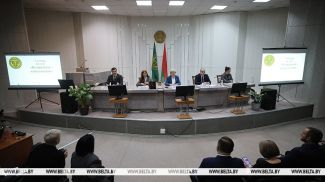MINSK, 20 May (BelTA) - Food security is an important part of economic security and a key factor in maintaining the sovereignty of the CIS countries, Belarusian Prime Minister Roman Golovchenko said at an online meeting of the CIS Heads of Government Council on 20 May, BelTA has learned.
“We see the following as priority tasks for the near future and points for further growth. First of all, it seems important to continue systematic joint work on the implementation of the action plan to implement the first stage of the CIS Economic Development Strategy for the period up to 2030. We will be adjusting it taking into account current realities,” said Roman Golovchenko.
In his words, it is necessary to deal with existing trade barriers and restrictions within the free trade zone for goods in the CIS. “The current situation forces us to rethink many approaches to regulating foreign trade and look for additional reserves to prevent shortages of priority goods. At the same time, we consider it of crucial importance to speed up the preparation of an agreement on free trade in services and investment with a view to signing it at the autumn meeting of the CIS Heads of Government Council in Nur-Sultan,” the prime minister said.
According to Roman Golovchenko, food security is an important part of economic security and a key factor in maintaining the sovereignty of the CIS countries. “At the end of January 2022, the CIS Executive Committee appealed to the governments of the countries with a request to send proposals to the draft strategy for the development and interaction of the food systems of our states. I believe that the adoption and implementation of this strategy will contribute to the sustainable development of domestic food production, prevent internal and external threats to food security, and help ensure strategic stocks of high-quality food products,” the head of government stressed.
The prime minister recalled that on 8 April 2022 the European Union closed its borders for vehicles registered in Belarus and Russia. Exceptions apply to the transportation of only certain types of products. “In this regard, we are reorienting our cargo flows. I consider it necessary to maximize the potential of the CIS internal transport market. There are reserves here. In the EAEU, we have adopted a program for the gradual liberalization of cabotage transportation of goods. I believe that within the CIS we also need to take measures to improve transport corridors, create modern conditions for the movement of goods between the CIS member states, remove restrictions on the movement of individuals and all types of transport,” he said.













